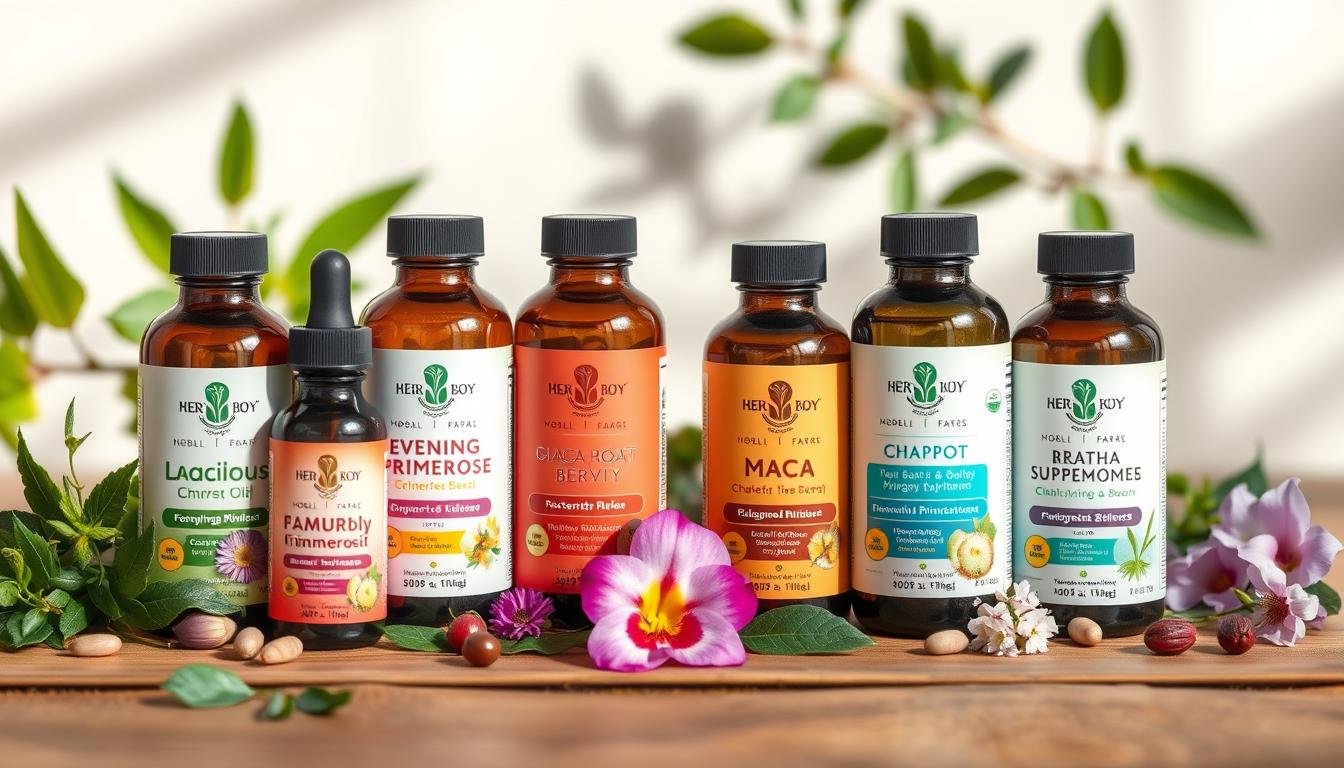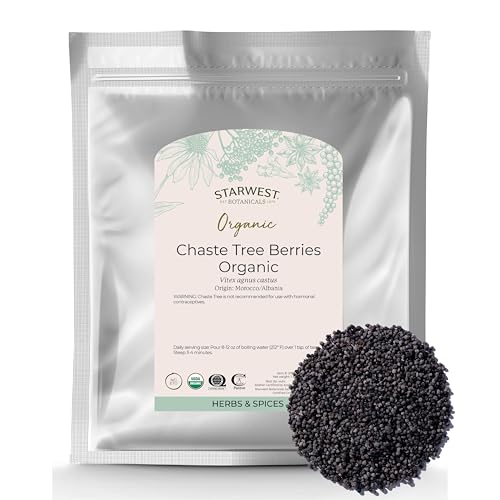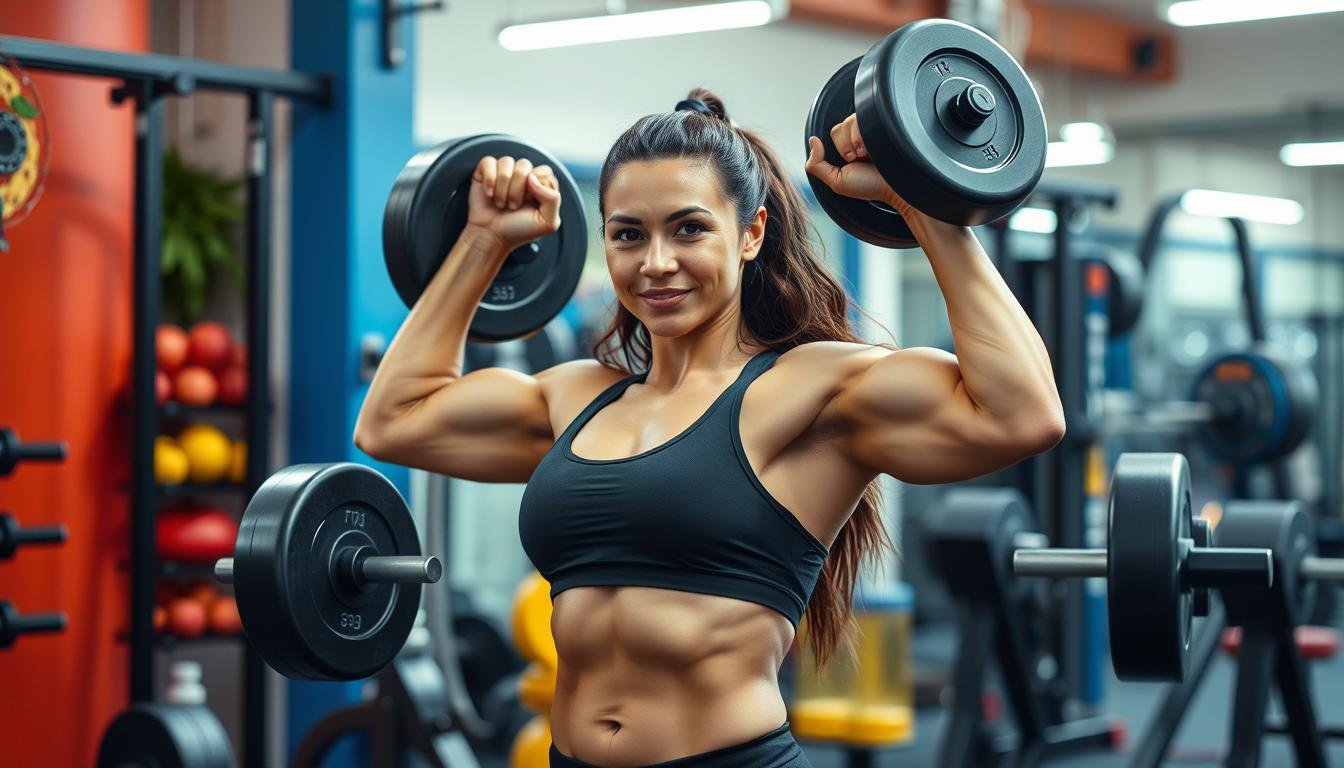This post may contain affiliate links, which means I may receive a commission if you purchase using these links. As an Amazon Associate, I earn from qualifying purchases.
Have you ever felt like your mood swings wildly or that weight just won’t budge? Many believe hormonal imbalance is a given for women. Yet, natural hormone balancers exist to support balance. Today’s world bombards us with stress, blue light, and poor diets, disrupting our hormones. It’s vital to understand how supplements can help.
They can improve your mood and reproductive health. Let’s delve into the top 10 supplements for women’s hormonal balance. Discover how they can transform your well-being!
Key Takeaways
- Hormonal balance is crucial for mood, energy, and overall health.
- Diet, stress, and lifestyle significantly affect hormone levels.
- Natural supplements can aid in managing hormonal imbalances.
- Healthy fats and fibre consumption support hormone regulation.
- Incorporating the right foods is as vital as taking supplements.
Understanding Hormonal Imbalance in Women
Hormonal imbalance in women can feel like navigating a maze without a map. At its core, this imbalance occurs when there’s either an excess or a deficiency of hormones like estrogen, progesterone, or testosterone. Various life stages can trigger these fluctuations—think menstruation, pregnancy, perimenopause, and menopause. Unwanted surprises in the menstrual cycle, such as periods arriving less than 24 days apart or more than 38 days apart, often point to this issue.
Several factors contribute to hormonal imbalance, ranging from lifestyle choices to stress, diet, and underlying health conditions. Each of these elements plays a role in the delicate orchestra of the endocrine system. For instance, women with Polycystic Ovary Syndrome (PCOS) can benefit from significant lifestyle adjustments, such as a 10 percent weight reduction, which may help regulate their menstrual cycles.
Understanding how our bodies work can empower us to seek appropriate treatments. Women’s health supplements tailored for hormonal balance can be helpful, too. Potential interventions might include hormone therapy options like oral contraceptives or hormonal intrauterine devices (IUDs). Moreover, anti-androgens can be particularly beneficial for blocking the effects of male hormones like testosterone, especially in conditions such as PCOS.
I must admit navigating through options can seem daunting. Simple choices, such as incorporating healthy diets and regular exercise, make a big difference by helping regulate hormone levels. Recommendations to monitor our supplements and medications stand out as crucial, too. Consulting with healthcare professionals keeps us on track, ensuring effective hormonal imbalance management with endocrine system support.

Signs and Symptoms of Hormonal Imbalance
Women need to recognize the signs of hormonal imbalance for optimal health. Symptoms like mood swings and sudden weight gain can disrupt daily life. Fatigue, irregular menstrual cycles, and decreased libido also play a role.
Painful periods and hot flashes during menopause add to the discomfort. These symptoms highlight the importance of practical progesterone support. They show how hormonal imbalances can affect our well-being.
Stress can worsen these symptoms, leaving us feeling overwhelmed. Early recognition of these signs is vital to better health. Understanding how lifestyle changes and supplements can help is crucial for women’s health.

How Diet Influences Hormonal Balance
Nutrition is the foundation for maintaining hormone health. I’ve found that a balanced diet for hormonal balance significantly impacts hormone regulation. I focus on whole foods, including healthy fats, lean proteins, and fibre. This creates an ideal environment for hormones to flourish.
Integrating specific nutrients into my meals supports hormone synthesis and regulation. Dark green leafy vegetables, avocados, legumes, nuts, and seeds are rich in magnesium, which is crucial for a healthy hormonal balance. Omega-3 fatty acids in fatty fish also play a crucial role in natural hormone balancers, enhancing stability.
Every day, I aim to meet specific dietary goals to support my hormone health:
- Consume 7-8 portions of a rainbow of vegetables.
- Add 2 tablespoons of ground flaxseeds for their phytoestrogens.
- Enjoy 1 or 2 low-sugar fruits to maintain energy levels.
- Include a fist-size portion of wholegrain slow-release carbohydrates in 1 or 2 meals.
- Incorporate a mix of organic grass-fed meat and plant protein for balanced nutrition.
Fermented foods like kefir and probiotic yogurts are essential for my gut microbiome. This supports hormone regulation. A diverse diet ensures a balance between gut health and hormonal dynamics. I particularly enjoy nutrient-dense foods like cruciferous vegetables, which aid in hormone detoxification.
Herbs and spices with anti-inflammatory properties are also crucial. Ingredients like ginger, turmeric, and garlic add flavour and support hormonal harmony.
Understanding the complex web of over 200 hormones in our bodies highlights the importance of diet. Each meal is a chance to influence hormones like estrogen, testosterone, cortisol, and insulin, improving my health.

| Food Type | Recommended Daily Intake | Benefits |
|---|---|---|
| Vegetables | 7-8 portions | It supports hormone detoxification and provides essential vitamins. |
| Flaxseeds | 2 tablespoons | Rich in phytoestrogens that balance estrogen levels. |
| Low-Sugar Fruits | 1 or 2 | Stabilizes blood sugar levels and nourishes the body. |
| Wholegrain Carbs | 1 fist-size portion | It provides energy and keeps blood sugar stable. |
| Organic Proteins | Mixed sources | Supports hormone synthesis and overall well-being. |
| Fermented Foods | Daily | It enhances gut health, which is vital for hormone regulation. |
Top 10 Supplements to Support Hormonal Balance Naturally for Women
Discovering the perfect estrogen-balancing supplements can be transformative for women dealing with hormonal imbalances. The right supplements can significantly impact menopause relief and overall health. Here, I’ve curated a list of the top 10 supplements for natural hormonal balance in women.
DIM (Diindolylmethane)
DIM is a compound extracted from cruciferous vegetables like broccoli and cauliflower. It aids in estrogen metabolism, potentially lowering the risk of estrogen dominance. This makes DIM a favourite among women seeking effective PCOS supplements.
WomenSense EstroSense
This supplement is designed to support healthy estrogen metabolism. It’s particularly beneficial for those seeking menopause relief, as it may ease symptoms of menopause and PMS. Many women have found it helpful during their most challenging times.
Cira Symmetry Hormone Balance Complex
Renowned for its blend of adaptogens, this supplement aids overall hormonal balance. Its unique formulation aims to restore equilibrium, making it a valuable addition to the top 10 supplements for natural hormonal balance in women.
Myo-Inositol & D-Chiro Inositol
This combination is highly effective for women with PCOS. Myo-inositol enhances insulin sensitivity, while D-chiro-inositol is crucial for hormonal balance. It’s a standout fertility supplement on the market today.
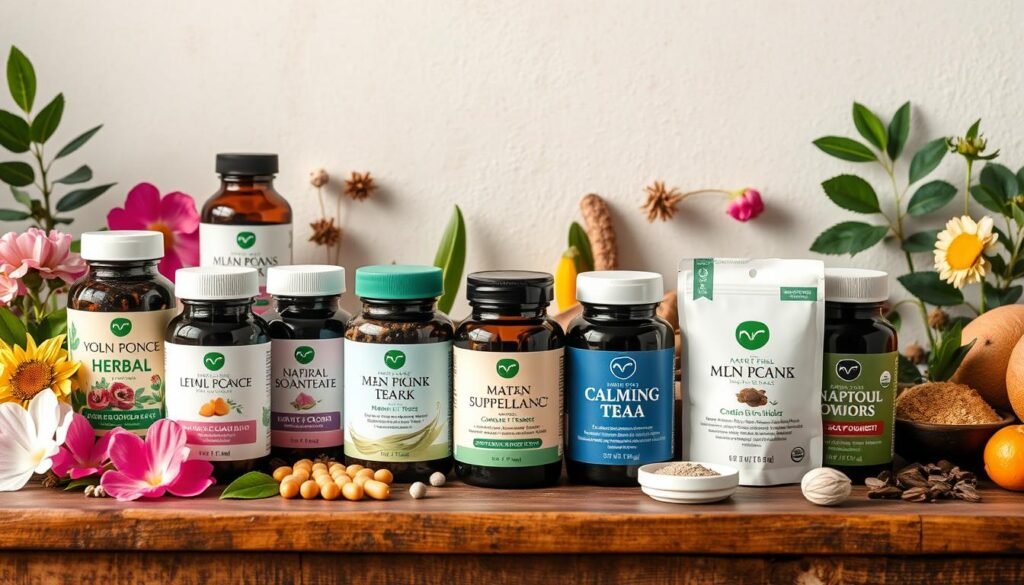
Understanding Each Supplement’s Role in Hormonal Health
Understanding how each supplement works is crucial for optimal hormonal health. With many hormone balance supplements on the market, focusing on key natural hormone balancers is vital. These can help relieve menopause and improve overall health. Let’s explore two standout supplements and their benefits.
How DIM Affects Estrogen Metabolism
DIM, or Diindolylmethane, comes from cruciferous vegetables like broccoli and Brussels sprouts. It significantly impacts estrogen metabolism, promoting a healthy balance of estrogen levels. DIM also helps reduce high estrogen levels, which can cause health issues. This balance contributes to overall wellness and eases many menopause symptoms, making DIM a top choice for natural hormone balancers.
The Benefits of Myo-Inositol for PCOS
Myo-inositol is a standout supplement for women with Polycystic Ovary Syndrome (PCOS). It improves ovarian function and helps restore regular menstrual cycles. Additionally, it enhances insulin sensitivity, aiding in weight loss and hormone regulation. This makes it essential for those seeking hormone balance supplements focused on fertility and metabolic health.
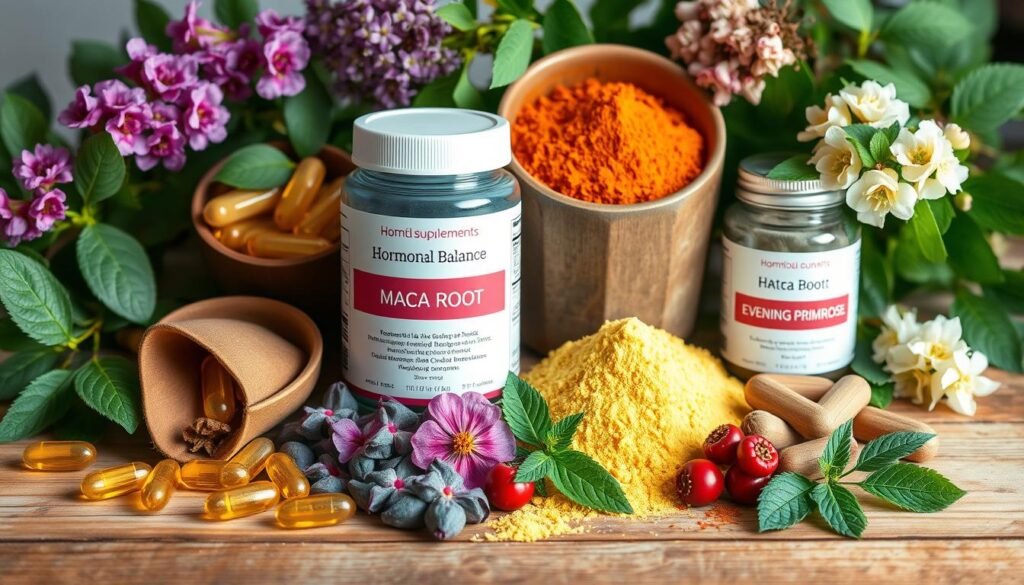
The Importance of Lifestyle Changes Alongside Supplementation
Seeking hormone health requires more than supplements. Lifestyle changes are equally crucial. Studies show that habits significantly impact hormonal balance. For example, a 2015 study highlighted how sleep disturbances can harm hormones, leading to health problems.
Many of us spend too much time on screens at night. A 2015 study found that artificial light exposure disrupts our sleep and affects hormone regulation. Getting enough sleep is not just for feeling good; it’s essential for balancing hormones like cortisol and insulin.
Stress management is also crucial. A 2017 study showed that stress increases adrenaline and cortisol, upsetting our hormonal balance. Activities like mindfulness, meditation, or exercise can lower stress hormone levels. Even brief exercise can help regulate hormones that control hunger, as a 2014 study found.
Our diet is another critical factor—sugars, including table sugar and high-fructose corn syrup, harm hormone levels. Eating healthy fats, like those in coconut oil, can improve insulin response and support hormone health. Cruciferous vegetables, such as broccoli and kale, help manage estrogen levels, especially for those with estrogen dominance.
Healthy fats offer more than just nutritional benefits. Omega-3 fatty acids from fish, flaxseeds, and walnuts support hormone production, and olive oil has also been shown to balance appetite-regulating hormones.
Adopting lifestyle changes for hormonal balance is not just a trend; it’s vital. It’s about a holistic approach that includes sleep, stress management, diet, and exercise.

Consulting with Healthcare Professionals
Understanding hormonal balance can be as challenging as finding a needle in a haystack. To address hormonal imbalances effectively, working with healthcare professionals is essential. They can create a personalized plan based on my symptoms, lifestyle, and medical history.
During women’s health consultations, healthcare professionals might suggest various tests. Like the MUSE hormone testing kit, hormone testing checks estrogen, progesterone, and cortisol levels. This information helps them provide more targeted advice. With the test results, they can recommend the right supplements and dosages for my hormonal health.
A few fundamental vitamins worth discussing during these consultations include:
| Vitamin | Recommended Daily Dosage |
|---|---|
| Vitamin D (with K2) | 2,000 to 4,000 IU |
| Vitamin B6 | 25 to 50 mg |
| Vitamin B9 (Folate) | 400 to 800 mcg |
| Vitamin B12 | 2.4 mcg or higher |
Regular visits with healthcare professionals keep me informed about my health. Adopting lifestyle practices like stress management and getting enough sleep—7 to 9 hours—is crucial. Chronic stress can upset hormonal balance, making these habits essential.
Working with qualified professionals can make any approach to hormonal health more effective. Their advice provides a solid base, allowing me to explore supplements safely and effectively.

Potential Side Effects and Precautions
I often remind friends that hormonal supplements promise balance but come with side effects of hormonal supplements. Each body reacts uniquely, leading to side effects from mild digestive issues to significant menstrual cycle changes or allergic reactions. It’s a concern when you want to feel your best but face unexpected problems.
Before starting any new regimen, it is crucial to consult a healthcare provider. They can help understand how supplements might interact with medications or health conditions, affecting precautions for hormone health. This step is key to making informed decisions.
To illustrate some common side effects, I’ve compiled this handy table:
| Supplement | Possible Side Effects |
|---|---|
| DIM (Diindolylmethane) | Digestive issues, headaches |
| Myo-Inositol | Nausea, upset stomach |
| Black Cohosh | Stomach upset, rash |
| Chasteberry | Acne, headache, nausea |
Understanding these potential side effects is as vital as celebrating the benefits. Education is a powerful tool in the quest for optimal hormonal health. Being cautious makes the journey smoother.

Conclusion
In my quest for optimal health, I’ve discovered that hormonal balance is crucial for women’s health and overall well-being. Achieving this balance goes beyond just supplements or dietary changes. It involves a holistic approach, combining nutrition, lifestyle adjustments, and expert advice. Each supplement plays a key role, offering unique benefits to manage hormonal shifts.
For example, herbs like Nigella sativa and ashwagandha have shown promise in balancing hormones and reducing stress. Supplements like Myo-inositol also help combat PCOS, which affects 1 in 10 women. This shows that a comprehensive approach is essential for effectively navigating women’s health challenges.
Yet, while these supplements are beneficial, ongoing research is vital to confirm their long-term safety and effectiveness. As I continue my journey toward hormonal balance, I’m committed to staying updated, seeking professional advice, and making lifestyle choices that improve my quality of life. My health journey is personal, and I’m dedicated to finding what truly benefits me.
FAQ
What are the best natural hormonal imbalance supplements for women?
Top natural hormone balancers include DIM (Diindolylmethane), WomenSense EstroSense, and Cira Symmetry Hormone Balance Complex. Myo-inositol and D-Chiro Inositol are also recommended. These support estrogen metabolism, ease menopause symptoms and promote hormonal balance.
How can I tell if I have a hormonal imbalance?
Signs of hormonal imbalance include mood swings, fatigue, and weight gain. Irregular menstrual cycles, decreased libido, and hot flashes are also indicators. If you notice these symptoms, seek a healthcare professional’s advice.
Do lifestyle changes impact hormonal health?
Yes, they do! Regular exercise, stress management through yoga and meditation, and enough sleep boost hormone health. Combining these with supplements can significantly improve your hormonal balance.
Are there any side effects to using hormonal imbalance supplements?
Yes, side effects can include digestive issues, changes in the menstrual cycle, or allergic reactions. Always consult a healthcare provider before starting supplements to ensure safety and avoid interactions.
Can dietary choices affect my hormones?
Indeed, they can! Eating whole foods, healthy fats, lean proteins, and fibre supports hormonal balance. Magnesium and omega-3 fatty acids are especially beneficial for hormone synthesis and regulation.
How can I find the right supplements for my hormonal issues?
Seeking advice from a healthcare professional is key. They can evaluate your symptoms and health history and suggest dietary choices and supplements tailored to your needs.
Source Links
- How to balance hormones naturally: 11 ways
- Naturally Balance Your Hormones With These Supplements
- Top 10 foods to restore hormone balance
- Hormone Imbalance and the Menstrual Cycle: Causes and Treatments
- Women’s health, hormonal balance, and personal autonomy
- No title found
- 10 Natural Ways to Balance Your Hormones: Diet Tips and More
- 5 Essential Vitamins & Supplements That Help Balance Hormones
- Hormone-Balancing Foods: How Your Diet Can Help Keep Your Hormones Functioning Well
- 11 Supplements for Menopause Symptoms
- The Best Supplements for Hormone Balance During Perimenopause and Menopause
- The Best Research-Backed Supplements to Balance Hormones
- No title found
- Active Women Across the Lifespan: Nutritional Ingredients to Support Health and Wellness
- How to Balance Hormones Naturally
- The Top Vitamins to Balance Hormones for Women
- Hormonal Supplements for Women: Black Cohosh, DIM, and Chasteberry | Healthy Planet
- No title found
- Hormonal imbalance: Symptoms, causes, and treatment
- Can Supplements Help Balance Your Hormones?
- 5 Impressive Herbs That Help Balance your Hormones
- 10 Best Supplements For PCOS
- 10 Best Vitamins and Supplements to Balance Hormones

